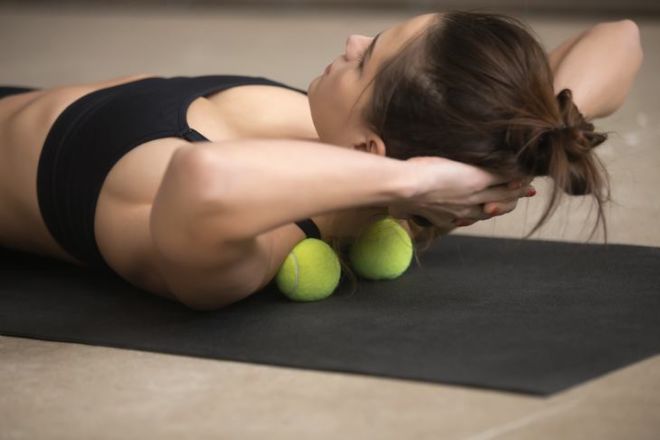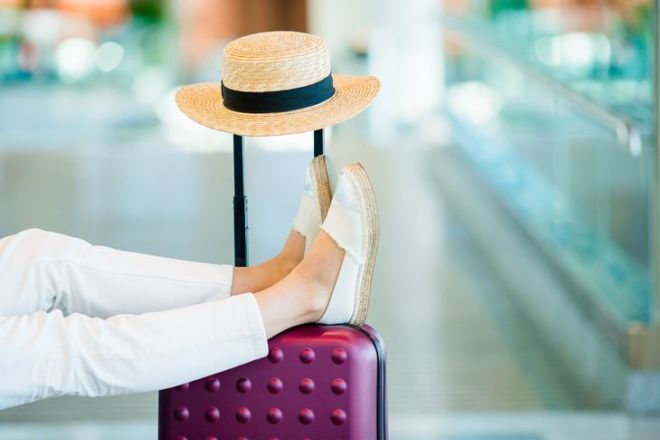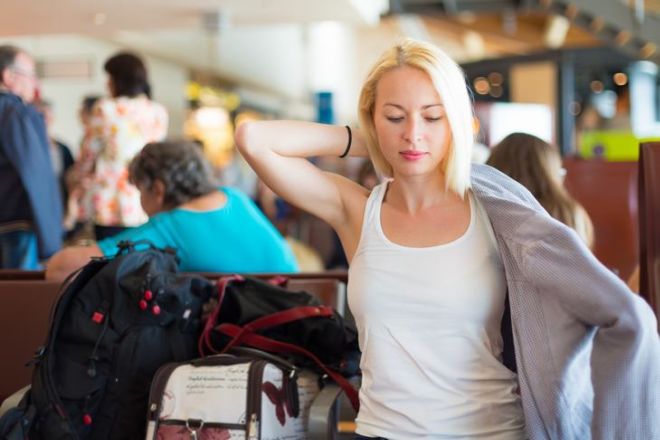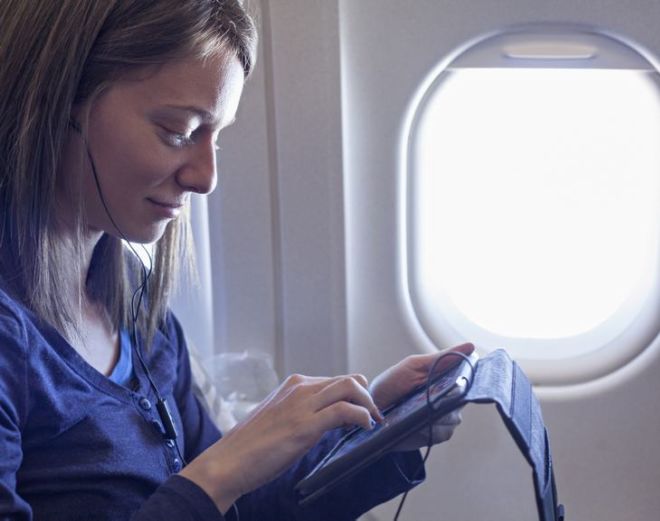10 Expert Tips For A Long Duration Flight
Posted: Tue Jan 22, 2019 12:06 pm
Long flights can be pretty tough - you have to stay in your seat for a long time, your usual sleep schedule gets ruined, and the flight attendants decide when you are going to eat. But, if you are thoroughly prepared, these little inconveniences won't make you feel exhausted even after a long-haul flight. Bear in mind these 10 hacks that will help you survive a long flight without damaging your nerves and body.
1. Bring a tennis ball

when sitting, place a tennis ball or a massage ball in the arch of your back. This will help release muscle stiffness and will prevent lower back pain during a flight. You'll also get a nice DIY back massage.
2. Plan your bathroom usage
The best time to use the airplane bathroom is right after flight attendants have served the food and moved out of the aisle, as people usually wait until their trays are collected before getting up from their seats. So, while other passengers are occupied with their food, and waiting for their trays to be taken away, you can rest assured that the bathroom will be relatively clean and peaceful.
3. Create some space for your legs

While you may think that it is more convenient to keep your belongings close to you during a flight, cramming all your hand luggage bags under the seat in front of you will mean that you won't have enough room for your legs. To prevent deep vein thrombosis, giving your feet space is essential. Try to reduce the number of personal items to a minimum, and instead, store them in the overhead compartment.
4. Pack some extra snacks
Plane food is high in carbs and low in protein. So, if your health is something you are concerned about, or you just want to stick to your own eating schedule, take some snacks on board. Try nutritious snacks like almonds, or dried apricots and carrot or cucumber sticks, as well as apples, bananas or protein bars.
5. Dress in layers and keep your feet warm

It's hard to know what the temperature on the plane will be like. Some planes tend to be quite hot, while others can be quite cold. To help you adapt to these changes in temperature, wear several layers of clothing. This will allow you to peel off or add an extra cardigan if needed, always ensuring that you feel comfortable. Another great tip is to take off your shoes after boarding and put on a pair of cozy socks to help keep your feet warm and to prevent them from swelling by giving them some breathing space.
6. Protect your sleep
If you plan on sleeping during your flight, keep an eye mask, this will help block out all the surrounding light and be sure to get noise-canceling headphones or earplugs. This will come as a real blessing if there's a screaming baby near you, or if people are speaking too loudly. Another tip? When sleeping, make sure you wear your seat belt over your blanket or your outer layer of clothing, so when the seatbelt-on light comes, flight attendants won't disturb you.
7. Bring an empty water bottle

To prevent a headache and fatigue caused by dehydration, drink about 8 ounces of water every hour you are in the air. While you can always ask your flight attendants to bring you another fresh cup from time to time, it's always best to have your own empty bottle before boarding, which you can fill up at the airport, or on the plane.
8. Stay hygienic
While you may be on a long-haul flight, try to stick to your daily routine which includes, brushing your teeth, washing your face, and moisturizing your skin. This will make you feel more comfortable before you fall asleep and refreshed in the morning. Essentials you need to take with you include a toothbrush, toothpaste, hand sanitizer, sanitary wipes, a moisturizer, a deodorant, lip balm.
9. Use a seat pad

Having your own travel pillow is essential as it supports your neck and protects it from injuries during take-off or turbulence. If you want to feel even more comfortable, it's better to bring a seat pad on board. You can place it right on your seat or roll it to make an extra pillow for your arms or back.
10. Practice some yoga moves
To protect your legs from swelling and to prevent back pain, every two hours during a long-haul flight do the following exercises:
1. Interlace your fingers and turn your palms up. Keep your arms raised toward the ceiling and stretch your spine for as long as you can.
2. Keeping your arms in the previous position, slowly twist to the right. Then, return to the center and twist to the left, repeat about 3/4 times.
3. Place your elbows on top of the seat in front of you, about shoulder-distance apart, then relax your head and let it fall through your upper arms until you feel the stretch in your back and neck.
4. Keep your spine straight and tilt your head to the right, placing your right hand on your head and gently press it to deepen the stretch, holding for a few seconds, then repeat on your left side.
5. Straighten your right leg and stretch it out as far as you can. Then, repeat with the other leg.
1. Bring a tennis ball

when sitting, place a tennis ball or a massage ball in the arch of your back. This will help release muscle stiffness and will prevent lower back pain during a flight. You'll also get a nice DIY back massage.
2. Plan your bathroom usage
The best time to use the airplane bathroom is right after flight attendants have served the food and moved out of the aisle, as people usually wait until their trays are collected before getting up from their seats. So, while other passengers are occupied with their food, and waiting for their trays to be taken away, you can rest assured that the bathroom will be relatively clean and peaceful.
3. Create some space for your legs

While you may think that it is more convenient to keep your belongings close to you during a flight, cramming all your hand luggage bags under the seat in front of you will mean that you won't have enough room for your legs. To prevent deep vein thrombosis, giving your feet space is essential. Try to reduce the number of personal items to a minimum, and instead, store them in the overhead compartment.
4. Pack some extra snacks
Plane food is high in carbs and low in protein. So, if your health is something you are concerned about, or you just want to stick to your own eating schedule, take some snacks on board. Try nutritious snacks like almonds, or dried apricots and carrot or cucumber sticks, as well as apples, bananas or protein bars.
5. Dress in layers and keep your feet warm

It's hard to know what the temperature on the plane will be like. Some planes tend to be quite hot, while others can be quite cold. To help you adapt to these changes in temperature, wear several layers of clothing. This will allow you to peel off or add an extra cardigan if needed, always ensuring that you feel comfortable. Another great tip is to take off your shoes after boarding and put on a pair of cozy socks to help keep your feet warm and to prevent them from swelling by giving them some breathing space.
6. Protect your sleep
If you plan on sleeping during your flight, keep an eye mask, this will help block out all the surrounding light and be sure to get noise-canceling headphones or earplugs. This will come as a real blessing if there's a screaming baby near you, or if people are speaking too loudly. Another tip? When sleeping, make sure you wear your seat belt over your blanket or your outer layer of clothing, so when the seatbelt-on light comes, flight attendants won't disturb you.
7. Bring an empty water bottle

To prevent a headache and fatigue caused by dehydration, drink about 8 ounces of water every hour you are in the air. While you can always ask your flight attendants to bring you another fresh cup from time to time, it's always best to have your own empty bottle before boarding, which you can fill up at the airport, or on the plane.
8. Stay hygienic
While you may be on a long-haul flight, try to stick to your daily routine which includes, brushing your teeth, washing your face, and moisturizing your skin. This will make you feel more comfortable before you fall asleep and refreshed in the morning. Essentials you need to take with you include a toothbrush, toothpaste, hand sanitizer, sanitary wipes, a moisturizer, a deodorant, lip balm.
9. Use a seat pad

Having your own travel pillow is essential as it supports your neck and protects it from injuries during take-off or turbulence. If you want to feel even more comfortable, it's better to bring a seat pad on board. You can place it right on your seat or roll it to make an extra pillow for your arms or back.
10. Practice some yoga moves
To protect your legs from swelling and to prevent back pain, every two hours during a long-haul flight do the following exercises:
1. Interlace your fingers and turn your palms up. Keep your arms raised toward the ceiling and stretch your spine for as long as you can.
2. Keeping your arms in the previous position, slowly twist to the right. Then, return to the center and twist to the left, repeat about 3/4 times.
3. Place your elbows on top of the seat in front of you, about shoulder-distance apart, then relax your head and let it fall through your upper arms until you feel the stretch in your back and neck.
4. Keep your spine straight and tilt your head to the right, placing your right hand on your head and gently press it to deepen the stretch, holding for a few seconds, then repeat on your left side.
5. Straighten your right leg and stretch it out as far as you can. Then, repeat with the other leg.